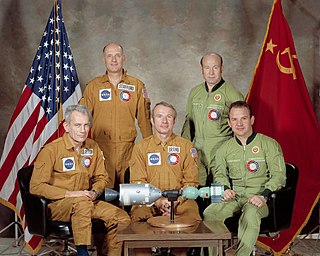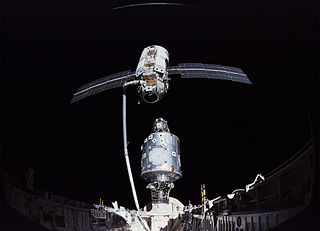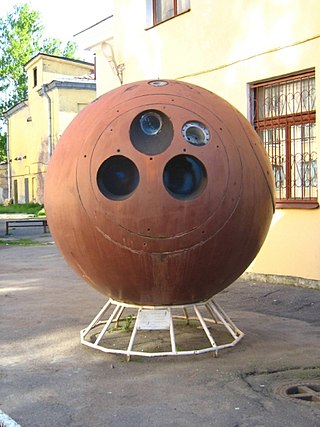Zarya may refer to:
Columbus is a Latinized version of the Italian surname "Colombo". It most commonly refers to:
Orion may refer to:

The Salyut programme was the first space station programme, undertaken by the Soviet Union. It involved a series of four crewed scientific research space stations and two crewed military reconnaissance space stations over a period of 15 years, from 1971 to 1986. Two other Salyut launches failed. In one respect, Salyut had the space-race task of carrying out long-term research into the problems of living in space and a variety of astronomical, biological and Earth-resources experiments, and on the other hand, the USSR used this civilian programme as a cover for the highly secretive military Almaz stations, which flew under the Salyut designation. Salyut 1, the first station in the program, became the world's first crewed space station.

Apollo–Soyuz was the first crewed international space mission, carried out jointly by the United States and the Soviet Union in July 1975. Millions of people around the world watched on television as an American Apollo spacecraft docked with a Soviet Soyuz capsule. The project, and its handshake in space, was a symbol of détente between the two superpowers amid the Cold War.

The Almaz program was a highly secret Soviet military space station program, begun in the early 1960s.

STS-88 was the first Space Shuttle mission to the International Space Station (ISS). It was flown by Space Shuttle Endeavour, and took the first American module, the Unity node, to the station.

Zvezda, also known as the Zvezda Service Module, is a module of the International Space Station (ISS). It was the third module launched to the station, and provided all of the station's life support systems, some of which are supplemented in the US Orbital Segment (USOS), as well as living quarters for two crew members. It is the structural and functional center of the Russian Orbital Segment (ROS), which is the Russian part of the ISS. Crew assemble here to deal with emergencies on the station.

Zarya, also known as the Functional Cargo Block, is the inaugural component of the International Space Station (ISS). Launched on 20 November 1998 atop a Proton-K rocket, the module would serve as the ISS's primary source of power, propulsion, and guidance during its early years. As the station has grown, Zarya's role has transitioned primarily to storage, both internally and in its external fuel tanks. A descendant of the TKS spacecraft used in the Salyut programme, Zarya was built in Russia but its construction was financed by the United States. Its name, meaning "sunrise," symbolizes the beginning of a new era of international space cooperation.

The Yuri A. Gagarin State Scientific Research-and-Testing Cosmonaut Training Center is a Russian training facility responsible for training cosmonauts for their space missions. It is in Star City of Moscow Oblast, a name which may refer to the facility itself or to its grounds.

Zenit was a series of military photoreconnaissance satellites launched by the Soviet Union between 1961 and 1994. To conceal their nature, all flights were given the public Kosmos designation.
Kvant is Russian for "quantum". See quantum (disambiguation).

Rassvet , also known as the Mini-Research Module 1 and formerly known as the Docking Cargo Module, is a component of the International Space Station (ISS). The module's design is similar to the Mir Docking Module launched on STS-74 in 1995. Rassvet is primarily used for cargo storage and as a docking port for visiting spacecraft. It was flown to the ISS aboard Space ShuttleAtlantis on the STS-132 mission on 14 May 2010, and was connected to the ISS on 18 May 2010. The hatch connecting Rassvet with the ISS was first opened on 20 May 2010. On 28 June 2010, the Soyuz TMA-19 spacecraft performed the first docking with the module.

Zarya was a sailing-motor schooner built in 1952, and since 1953 used by the USSR Academy of Sciences to study Earth's magnetic field.

Kurs is an automated system for docking uncrewed spacecraft used by the Soviet and later the Russian space program. The system is primarily used by Progress cargo spacecraft but has also been used by uncrewed Soyuz spacecraft and to dock new modules to the Russian Orbital Segment of the International Space Station. The radio-based control system was developed by the Research Institute of Precision Instruments in Moscow before 1985 and initially manufactured by the Kiev Radio Factory. Kurs is now manufactured in Russia.

The process of assembling the International Space Station (ISS) has been under way since the 1990s. Zarya, the first ISS module, was launched by a Proton rocket on 20 November 1998. The STS-88 Space Shuttle mission followed two weeks after Zarya was launched, bringing Unity, the first of three node modules, and connecting it to Zarya. This bare 2-module core of the ISS remained uncrewed for the next one and a half years, until in July 2000 the Russian module Zvezda was launched by a Proton rocket, allowing a maximum crew of three astronauts or cosmonauts to be on the ISS permanently.

The Functional Cargo Block or FGB was part of the Soviet TKS spacecraft. The TKS spacecraft was intended to be used as a resupply craft for Almaz space stations and saw some test flights in the Salyut space station program. The TKS spacecraft was formed by mating a FGB with a VA spacecraft, with both the VA and the FGB being capable of independent operation.

The Russian Orbital Segment (ROS) is the name given to the components of the International Space Station (ISS) constructed in Russia and operated by the Russian Roscosmos. The ROS handles Guidance, Navigation, and Control for the entire Station.
The Zarya spacecraft was a secret Soviet project of the late 1980s aiming to design and build a large crewed vertical-takeoff, vertical-landing (VTVL) reusable space capsule, a much larger replacement for the Soyuz (spacecraft). The project was developed during the years of 1985–1989 by Energia corporation until it was shelved in 1989, "on the eve of the Soviet Union's collapse" due to lack of funding. The name of the project was later reused by the Zarya space station module which served as the first component of International Space Station in 1998.

The Orbital Piloted Assembly and Experiment Complex was a 2009–2017 proposed third-generation Russian modular space station for low Earth orbit. The concept was to use OPSEK to assemble components of crewed interplanetary spacecraft destined for the Moon, Mars, and possibly Saturn. The returning crew could also recover on the station before landing on Earth. Thus, OPSEK could form part of a future network of stations supporting crewed exploration of the Solar System.

Zarya, full name Aleksandra Zaryanova, is an Overwatch character who first appears in the 2016 video game of the same name, a Blizzard Entertainment–developed first-person shooter. Voiced by Dolya Gavanski, Zarya is a Siberian champion weightlifter who enlists in a local defense force after her home comes under attack from robotic forces, later joining the restored peacekeeping force Overwatch. Conceived due to Geoff Goodman's desire to include a heavy weapon wielding character into the game, she was designed by Arnold Tsang after watching a weightlifting competition, feeling the concept would make for a strong character. Since her introduction, she has appeared in various spinoff media related to the franchise, including comics and merchandise, and later in another Blizzard developed title, Heroes of the Storm.